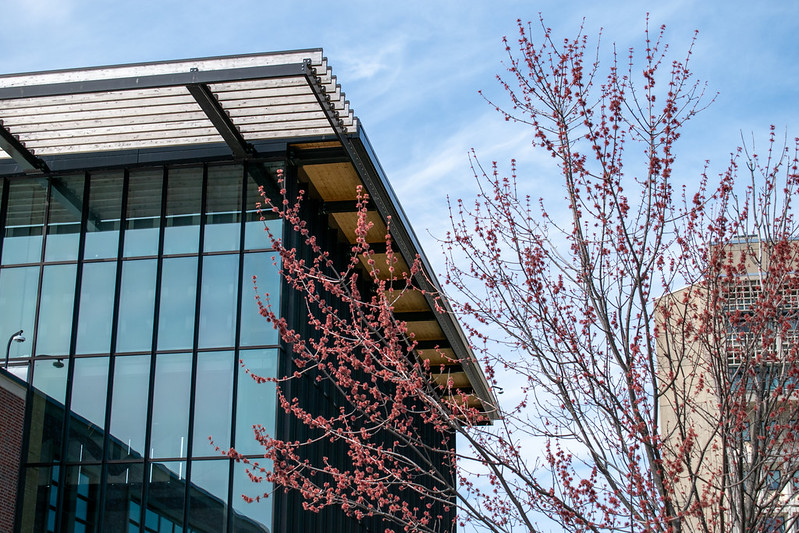The first thing that Rabia Saeed noticed when she stepped outside of New York’s John F. Kennedy International Airport was the sky. No, she marveled at it. Markedly universal in nature, Earth’s vast ceiling was a surprising note of change.
“The sky here is much bluer and much higher,” Saeed noted.
It was August 2018, her new beginning. Coming from Pakistan and in pursuit of a writing career, Saeed’s one-way journey to the U.S. was an incredible testament to her courage, ambition and intuition. Fresh out of college and braving into the unknown, she left JFK that day in search of a new home beneath that blue sky.
Saeed had majored in economics in college, but the momentum of her senior year gave rise to pressing feelings of misguidance and unfulfillment. Saeed, who had fallen into a deep and untamed love with books from the time she was a young child, was finally struck by a life-changing realization: her mind’s affinity for words would never be suppressed by the apparent sensibility of bland numbers.
“For me, reading is one of the reasons for living. It gives me more or as much pleasure as relationships and friendships. So, if I were to say, what are my two favorite things in the world, I would say reading and conversation,” Saeed said. “They make me feel connected to life; they make me understand life.”
Her undying love for reading and writing, however, complicated her post-college plans, as aspiring female writers in Pakistan were rarely set up for success. As Saeed explained, the country is extremely patriarchal and economically conservative, which is why dreams as daring as her own would never be openly embraced there.
That is why she decided to apply to several different graduate programs in fine arts across the U.S. Before long, she was accepted into the MFA program at the University of Massachusetts for fiction writing. She has lived in the U.S. ever since that pivotal day in 2018, never once letting intimidation or inexperience hinder her sense of belonging.
“There’s a splitting that happens, right? Like when I am in Pakistan, they’re like ‘Oh she’s come from America,’ and if I’m in America they say ‘Oh, she’s come from Pakistan,’ so wherever you are, you’re from somewhere else […] but I’ve become very comfortable in that in-between space,” Saeed explained.
Over the past three years, Saeed has devoted herself to telling the untold truth of what it means to be a Pakistani woman in a heavily masculinized society. She has written several pieces that specifically explore how Pakistan’s patriarchy is embedded in the physical culture of the land.
The stratified terrain of Pakistan is marked by several towering mountain peaks, traditionally inhabited by people of Pashtun ethnicity. The femininity of these strong, warrior-like people is seldom explored in literature, which is what Saeed is dedicatedly working to change.
Her writing spotlights female bodies not only living but thriving in these traditionally masculine settings—effectively exposing the miscorrelation between tenacity and masculinity.
Alongside Saeed’s writing career is her career as an instructor. The University’s MFA program has afforded her the opportunity to teach various creative writing classes to students of all backgrounds.
Her subversion of tradition carries over into her classroom, where she has implemented a modern and simplistic grading system: If it is clear that her students have fully invested themselves in their writing, they will automatically receive an A.
“I feel like you have to create a very safe and vulnerable space for people to do their best work,” Saeed explained. “I don’t like putting a value on creative work. That’s why when people talk about art or antiques, they say they’re priceless. Because to put a price on something is to put it in a box,” she added.
Saeed has often been stunned by the grandiosity and compartmentalization of the United States’ intensely capitalistic society, but she refuses to lend salience to limiting labels. She continues to explore and develop identities in both her writings and her teachings, never feeding into the constraint of categorization—a holistic and immeasurably powerful way of seeing the world around her.
Ava Aldrich can be reached at [email protected].




















Janel Ellis • Mar 4, 2022 at 11:17 pm
We’ll done Ava! I loved the language you used to describe the sky and Saeed’s reaction to it. Just beautiful! It’s wonderful and powerful tribute to her and I loved reading it. ❤️
Jonathan Aldrich • Feb 25, 2022 at 11:41 pm
Amazing !?
Jonathan Aldrich • Feb 25, 2022 at 11:40 pm
Amazing ??